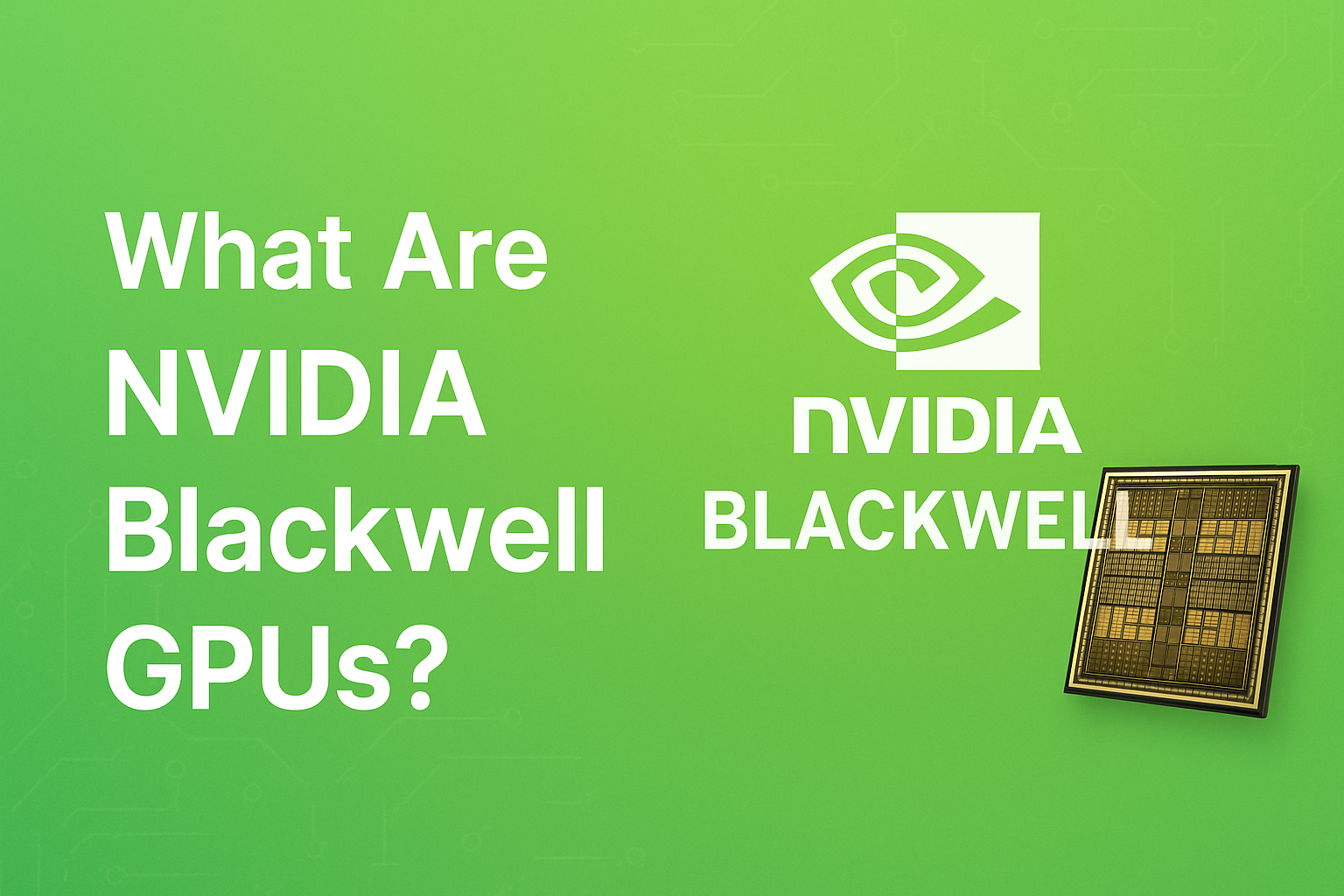Artificial intelligence has grown faster in the past few years than anyone expected. Models are getting bigger, workloads are becoming heavier, and industries are demanding more power for training and deployment.
To keep up with this growth, hardware must evolve just as quickly. That is exactly why NVIDIA introduced the Blackwell architecture.
If you have been hearing the term NVIDIA Blackwell GPUs everywhere and want to understand what makes them special, this detailed guide will walk you through everything.
We will explore what Blackwell is, how it works, why enterprises are excited about it, and what it means for the future of AI, data centers, and next generation computing.
Let us break down the architecture in a simple and understandable way.
What Are NVIDIA Blackwell GPUs
NVIDIA Blackwell GPUs are the next generation of AI and high-performance computing chips designed to support massive models, faster training, and lower power consumption.
Blackwell is the successor to the Hopper architecture and is built to handle the increasing scale of modern AI workloads such as large language models, generative AI, simulation, robotics, and real time processing.
NVIDIA designed Blackwell for organizations that work with advanced AI systems and need a level of computing that goes beyond traditional GPUs.
It brings improvements across speed, memory, efficiency, and multi GPU communication.
In simple words, Blackwell is built for the next era of AI growth. Everything about the architecture is tuned for extreme performance and smoother scaling.
Why Blackwell Matters The Need for a New Generation of AI Hardware
AI workloads are becoming more demanding. Training a large language model today requires huge amounts of compute power, fast memory access, and efficient data movement between GPUs.
Hopper GPUs made a huge leap, but Blackwell pushes the limit even further.
Here are a few reasons the world needs Blackwell:
- AI models are becoming larger
- Enterprise use cases require real time processing
- Data centers must reduce power usage
- Developers need shorter training time
- Companies want cost efficient scaling
Blackwell aims to speed up AI innovation while reducing infrastructure overhead.
Core Features of NVIDIA Blackwell GPUs
Let us break down the most important features so you understand what makes Blackwell special.
1. Faster Compute Power
Blackwell delivers faster performance for both training and inference.
It uses advanced Tensor Core technology that boosts AI operations such as matrix multiplication and transformer calculations. These operations are essential for training deep learning models.
The GPU is optimized so that developers can train and deploy AI systems faster with fewer performance bottlenecks.
2. Extremely Large Memory Capacity
Modern AI models often require a huge amount of memory.
Blackwell provides a higher bandwidth memory system that helps developers train large models without splitting data into multiple small pieces.
More memory means:
- Larger batch sizes
- Faster processing
- Improved efficiency in distributed training
- Better support for complex model architectures
This is one of the reasons Blackwell is a strong upgrade for teams working with generative AI.
3. Lower Power Consumption
A major highlight of Blackwell is its improved power efficiency.
Data centers struggle with high energy usage, but Blackwell aims to reduce power consumption per unit of performance.
This helps enterprises lower their energy bills and makes AI more sustainable.
4. Multi GPU Scaling
The Blackwell architecture supports strong multi GPU communication. This makes it easier for teams to build large GPU clusters that act as a single powerful system.
This is especially important for:
- Training large language models
- Running real time AI inference
- High performance scientific simulations
- Enterprise grade data processing
NVIDIA designed Blackwell to work smoothly in cluster environments.
5. Reliability and Enterprise Stability
The GPUs come with features that prevent data corruption or failure during heavy workloads. Enterprises using NVIDIA Blackwell GPUs get stronger protection for:
- Mission critical AI applications
- Robotics
- Self driving systems
- Healthcare diagnostics
- Finance and risk analysis
Blackwell also supports advanced error correction and monitoring tools.
Blackwell VS Hopper What Has Improved
One of the best ways to understand Blackwell is to compare it to Hopper, its predecessor.
Here is a simplified comparison:
| Feature | Hopper | Blackwell |
|---|---|---|
| Performance | Very high | Much higher |
| Memory | Large | Significantly larger |
| Power usage | High | Much lower for same performance |
| Scalability | Strong | Stronger multi GPU communication |
| AI performance | Optimized | Optimized and future ready |
| Efficiency | Good | Much better and cost friendly |
Blackwell targets both speed and sustainability, making it a larger upgrade than expected.
Real World Applications of NVIDIA Blackwell GPUs
Understanding the architecture is one thing, but seeing how it works in real scenarios helps even more. Here are industries that benefit directly from Blackwell.
1. Large Language Models and Generative AI
Training a model like GPT or any advanced LLM requires thousands of compute hours. Blackwell helps developers:
- Train models faster
- Reduce energy usage
- Deploy models with lower latency
- Run inference at scale
This makes Blackwell ideal for companies building chatbots, assistants, content generation tools, and AI agents.
2. Healthcare and Medical Imaging
Healthcare depends on high accuracy and data intensive models. Blackwell supports:
- Real time image processing
- Predictive diagnostics
- Genomics research
- Drug discovery simulations
Hospitals and research labs can process data more efficiently.
3. Autonomous Vehicles
Self driving systems must process large amounts of sensor data instantly. Blackwell helps with:
- Faster decision making
- Better perception models
- Real time data processing
This improves both safety and performance.
4. Robotics and Automation
Robotics needs powerful AI that responds quickly. Blackwell supports:
- Motion planning
- Object detection
- Real time control loops
This makes it useful for industrial automation and humanoid robots.
5. Scientific Computing
Scientists use GPUs for tasks like:
- Weather prediction
- Climate research
- Molecular simulation
- Space exploration modeling
Blackwell helps accelerate these workloads significantly.
How Blackwell Improves AI Training and Inference
To understand the performance jump, let us look at how Blackwell improves the two main phases of AI development.
Training
Training is the process of helping AI learn from data. Blackwell improves training by:
- Handling larger datasets
- Reducing batch time
- Speeding up matrix operations
- Improving distributed training efficiency
AI teams can complete weeks of work in days.
Inference
Inference is the process of using the trained model in real applications. Blackwell improves this by:
- Reducing response time
- Handling more requests per second
- Supporting real time tasks like chatbots or video processing
This is perfect for enterprises that need scalability.
How NVIDIA Blackwell GPUs Support Developers
Blackwell is not just hardware. NVIDIA also provides software tools that make the ecosystem complete.
Developers get access to:
- CUDA
- TensorRT
- NVIDIA AI Enterprise
- Model optimization tools
- Cloud integration options
- Data processing frameworks
This ecosystem helps teams build AI solutions quickly and efficiently.
Where You Will See Blackwell in the Future
Blackwell is expected to power:
- Next generation AI research labs
- Large GPU clusters
- Enterprise AI data centers
- Robotics and automation systems
- Self driving vehicle technology
- Edge computing devices
- Cloud AI platforms
As AI continues expanding, Blackwell will likely become the backbone of many advanced systems.
Why Enterprises Are Excited About Blackwell
Here are the top reasons companies want Blackwell:
Faster results
Training time is shorter, which speeds up product development.
Lower cost
Power efficiency leads to significant savings.
Future ready
Blackwell is prepared for the next wave of AI models.
Scalable
Works well for both small and massive clusters.
Enterprise grade
Stable, reliable, and secure for business applications.
Conclusion
The NVIDIA Blackwell GPUs represent a major step forward in AI computing.
They are built for teams working with massive datasets, advanced deep learn
ing models, and enterprise workloads that demand both speed and efficiency.
With improvements in performance, memory, efficiency, and scalability, Blackwell provides a strong foundation for modern AI development.
Whether you are building generative AI tools, running scientific simulations, or supporting real time robotics systems, Blackwell offers the kind of power needed to stay ahead.




